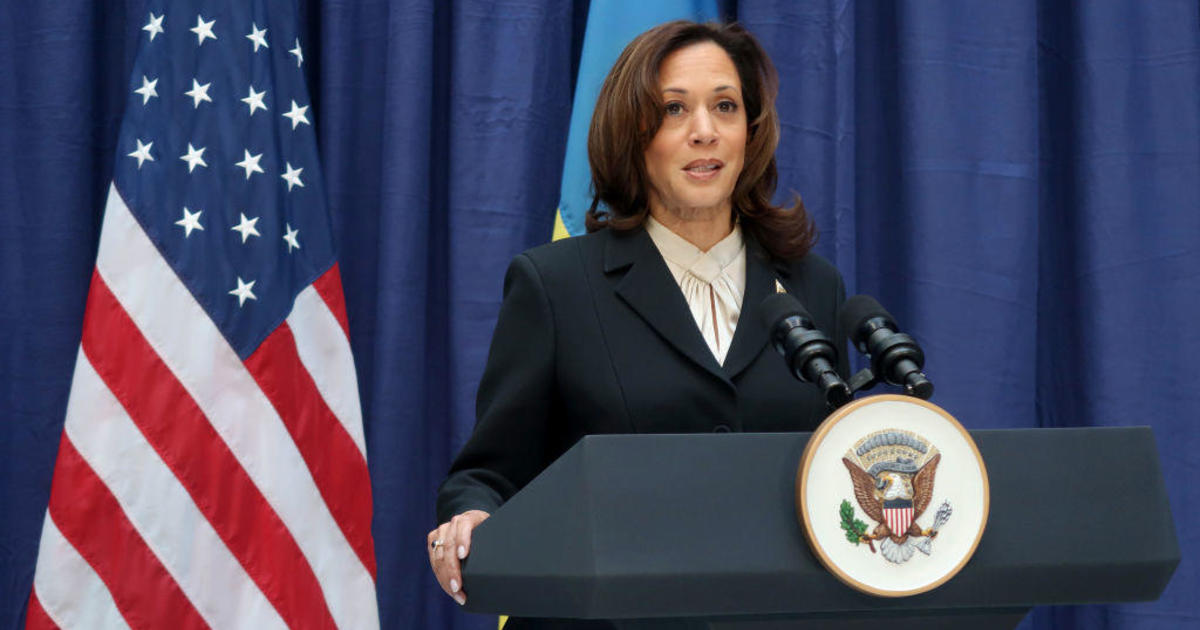After President Biden he announced that he will not stand for re-electionhe agreed Vice President Kamala Harris such as his choice to be the Democratic nominee. Here is some of Harris’ work on foreign policy over the past three and a half years:
The US border with immigrants from South and Central America
Ron Sachs/CNP/Bloomberg via Getty Images
Harris was assigned earlier in the Biden administration when he spoke to “root causes“Irregular immigration to the United States across its border with Mexico. He described the causes as corruption and lack of economic opportunities in other Central and South American countries.
He went to Latin America twice as vice president: to Mexico and Guatemala in 2021, and Honduras in 2022.
During a speech in Guatemala, he told people in the region who were considering making an unauthorized trip across the border: “Don’t come. Don’t come. The United States will continue to enforce our laws and to protect our borders.”
In Mexico, he announced that the US will invest millions of dollars in order to strengthen the protection of workers and pursue labor reforms there. He also announced a commitment to encourage investment in Mexico through things that include affordable housing loans.
Harris also announced a joint partnership with Mexico to promote economic opportunities in Honduras, Guatemala and El Salvador through agriculture and youth empowerment. In March, the White House announced that it had received a commitment from the private sector to invest $5 billion to develop economic opportunities and reduce violence in the region.
China, Taiwan and the South China Sea
Harris has taken the White House message very seriously on the challenges posed by China, speaking several times about curbing China’s influence.
“We know that Beijing continues to coerce, threaten and making claims to much of the South China Sea,” Harris said in a speech during a seven-day trip to Singapore and Vietnam in 2021.
“Beijing’s actions continue to undermine rule-based governance and threaten the sovereignty of nations,” he said. The United States stands with our allies and partners despite these threats. “
EVELYN HOCKSTEIN/POOL/AFP via Getty Images
In 2022, Harris said the US will “continue to support Defense of Taiwanwhich is in line with our long-term strategy.”
Harris’ visit to Singapore – a close American ally that is home to a key US Navy base in Southeast Asia – followed visits by Secretary of State Antony Blinken and Defense Secretary Lloyd Austin to of Asia in recent weeks. The Biden administration was eager to reassure Asian allies that it was concerned about China’s regional policies, especially after the US military withdrawal from Afghanistan.
“The reason I’m here is because the US is a world leader, and we take that role very seriously,” Harris said. He emphasized what he called the United States’ “enduring partnership” in Asia, citing the previous administration’s concerns about ensuring an “open and free” Indo-Pacific region, and “freedom of navigation” in the Pacific Ocean. South China.
NATO, Europe and Russia’s war on Ukraine
Harris has expressed clear support for Ukraine as it continues to fight to repel Russia’s continued aggression, and has reiterated the US’s commitment to the NATO alliance and America’s European allies.
Earlier this year, he vowed that the US would support the war in Ukraine “as long as it lasts.”
At the Munich Security Conference in 2022, Harris said the US has an “unwavering commitment to NATO and the Alliance.”
ANDREW HARNIK/POOL/AFP via Getty Images
The meeting came as Russia massed hundreds of thousands of troops on the Ukrainian border, days before launching its full-scale offensive.
“America’s commitment to Article 5 is ironclad,” Harris said in 2022, referring to the collective security clause in NATO law that requires an attack on any member to be treated as an attack on all. “This commitment is sacred to me, to President Biden and to our entire nation.”
The Israel-Hamas war and the wider Middle East
Harris said he supports Israel’s right to defend itself, but also that “if Israel defends itself, it doesn’t matter how.”
In an interview in December 2023, Harris said “as Israel pursues its military objectives in Gaza, we believe that Israel must do more to protect innocent civilians.”
He said that he and the president are still committed to the goal of a two-state solution.
“When this war ends, Hamas will not control Gaza, and Israel must be secure. The Palestinian people need political hope, economic opportunity and freedom. And this region, at large, must be unified.” and succeed. that vision,” said Harris.
Josh Paul, former director of the US State Department’s Office of Military Affairs, told CBS News on Monday that Harris may look to distance himself at least a little from Mr. Biden’s policy on Israel. Paul resigned in October over the Biden administration’s decision to continue supplying Israel with weapons as it began military operations in Gaza.
He said Harris has been “the first and loudest voice in the Biden administration to talk about the need for a ceasefire, to talk about Palestinian aid issues, and, obviously, to make people of the Palestinians,” and added that he believed there was “a place to do so.” some expectation that as president, he will take a different path.”
“I certainly wouldn’t expect the Harris administration to walk away, in any way, from the US’, you know, ironclad support for Israel,” he said.
He added that, in his opinion, Mr. Biden has found it “very difficult to change his mind on things that are, you know, fixed in his mind,” and said that Harris could prove himself as a “more effective leader” if you get a higher job in society.
Emmet Lyons contributed to this report.
#Kamala #Harris #foreign #policy #career #vice #president

